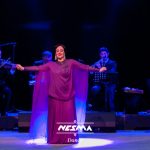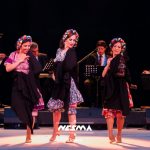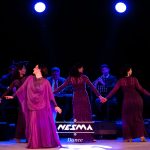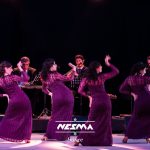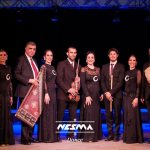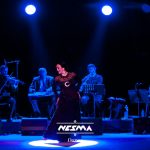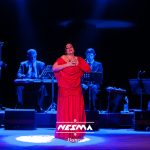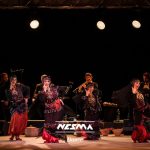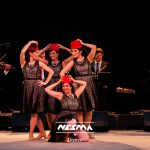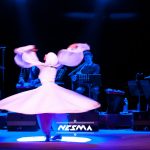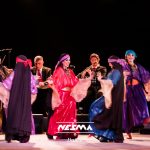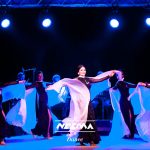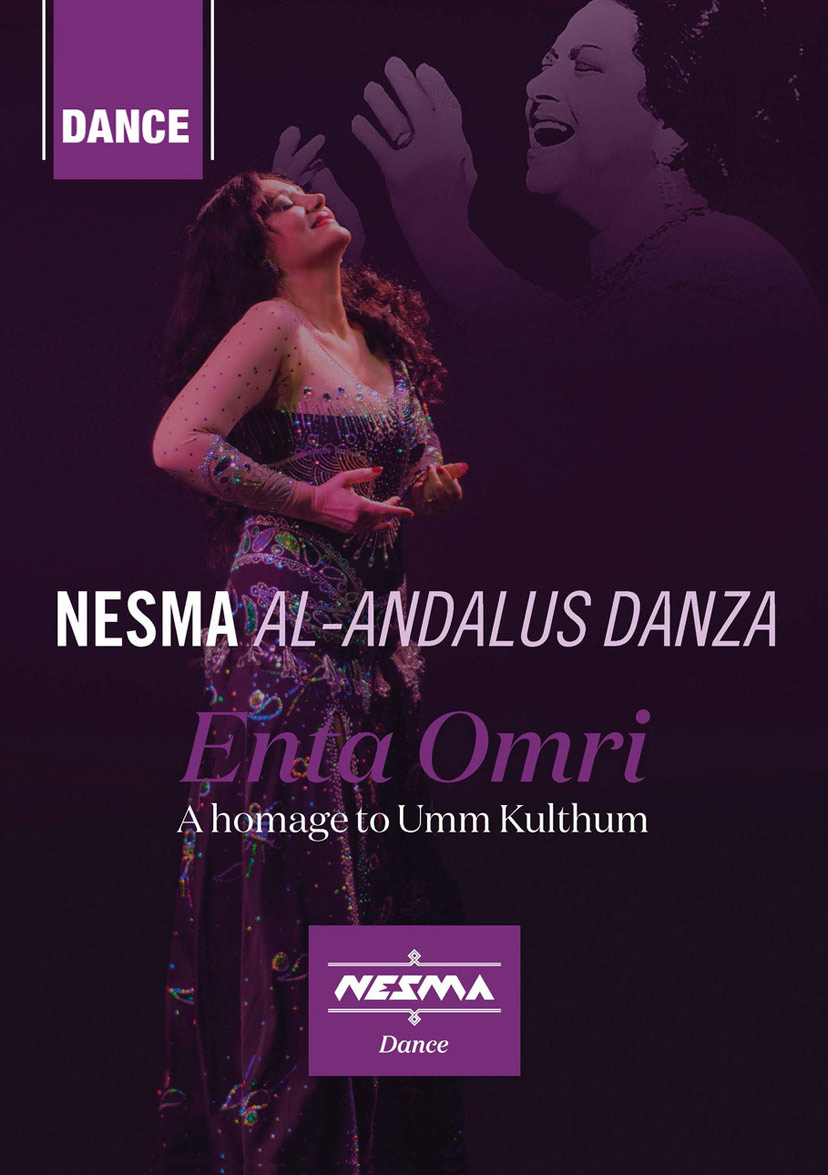
Umm Kulthum: “The Star of The Orient”
Umm Kulthum (1904–1975, Egypt), singer, film star, and 20th-century icon, entertained audiences from all strata of Arab society with her musical renditions of famous poems.
Renowned for the beauty of her voice, she was also celebrated for her power to convey the significance of their words.
Enta Omri is Umm Kulthum’s most well known song, composed by Mohamed Abded Wahab.
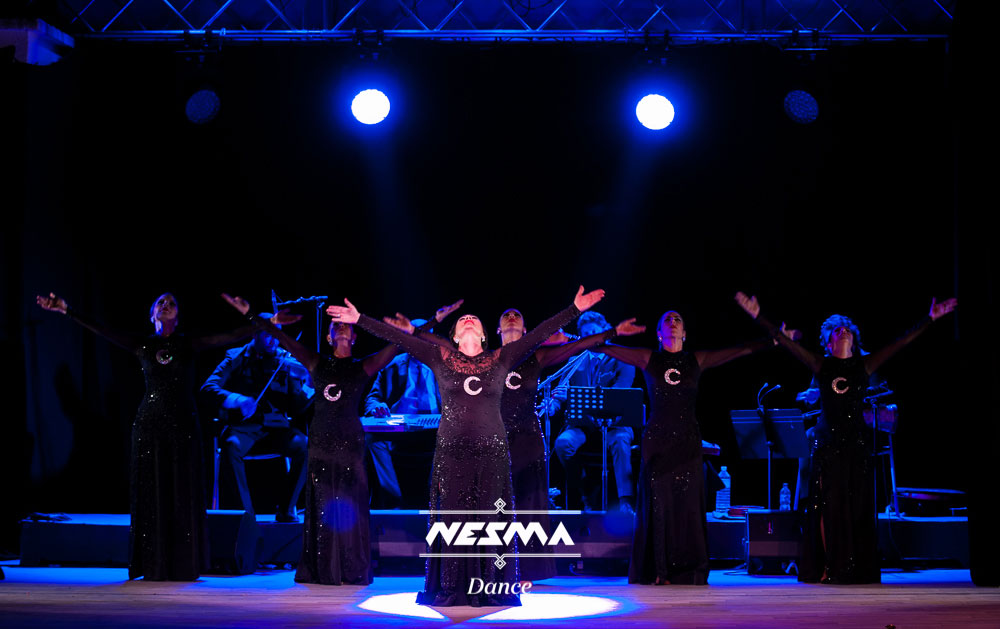
“Enta Omri” is a dance and music creation paying heartfelt and moving homage to the majestic diva of Arabic music, Umm Kulthum, marking the 40th anniversary of her passing.
In this performance Nesma tells the artistic journey and life of the singer. The spectacle, presented with the Al-Andalus Dance Company and The Cairo Arabic Music Ensemble, is based on theatrical foundations: the wonderful musical accompaniment, the screening of archive footage and the elegant and moving dances, evoke on the stage the image and emotions which Umm Kulthum has engraved on the collective memory of the Arab world.
In this new creation, Nesma expresses all the passion which she feels for Arabic music and the classic songs of Umm Kulthum. Her passion for oriental dance was born from this music while she was still an adolescent, and it moved her soul from the first time she heard it.
On her arrival in Cairo she started to imbibe the music of Umm Kulthum to the point where she knew the songs by heart. When she had flowered into one of the star dancers on the Cairo scene, she became a remarkable interpreter of the songs of Umm Kulthum.
Nesma is renowned for her elegance and her artistic sensitivity in the interpretation of Egyptian music. In this work she combines her experience as a solo dancer, which she acquired in Cairo, with her choreographic skills developed in the large scale works she has produced in Europe (“From the Nile to the Guadalquivir”, “Dreams of Al-Andalus”).
From this she has developed a new form of dance, at the same time refined, sentimental and contemporary, drawing from the sources of her art to express on the stage the famous “Tarab”; a kind of emotional ecstasy which invades the soul on hearing wonderful music.
Director and Choreographer: Nesma
Spanish Dancer and a Choreographer, Nesma discovered Arabic music and dance participating in shows created with her brothers for television. She was captivated and became initiated in oriental dance in Madrid and then Paris. She lived in Cairo from 1993 to 1998, where she deepened her knowledge of the culture and traditions of Egypt, while perfecting her artistic technique.
She had enormous success with more than 3,500 shows on the most famous stages of Cairo. She then worked with the Egyptian National Ballet “Reda Troupe” where she met the master choreographer Mahmoud Reda, becoming one of his greatest collaborators.
In 1998 she moved to Spain and founded her own school as well as the prestigious dance company Al-Andalus Danza. Her knowledge and her extensive experience have made her a recognised and much loved and sought after artist all around the world.
Music director: Ahmed Abdel Fattah
Ahmed Abdel Fattah is one of the finest accordion players in Cairo, and a renowned arranger, composer and sound engineer. He started his musical career by playing with renowned singers like Soad Mohamed, Warda, Hani Shaker and accompanying famous dancers such as Nagwa Fouad or Nahid Sabry. In 1985 he joined the Royal Arabic Orchestra of Oman and in 1995 he moved back to Cairo to run his own music studio. His collaboration with Nesma dates back to 1998.
Music
- Ya Sabah El Kheir – Mohamed Al-Qasagby / Bayram Al-Tounsy 1947
- Gamal El Donia – Zakariya Ahmed / Ahmed Ramy 1947
- Boukra Al Safar – Zakariya Ahmed / Ahmed Ramy 1940
- Ghannili Chewiaia Chewiaia – Zakariya Ahmed / Bayram Al-Tounsy 1945
- Ha Ablouh Boukra – Riad Al-Sonbati / Ahmed Ramy 1940
- Gadedt Hobak – Riad Al-Sonbati / Ahmed Ramy 1952
- Ana Fe Intezarak – Zakaria Ahmed / Bayram Al-Tounsy 1943
- Daret El Ayam – Mohamed Abdel Wahab / Maamoon Al-Shennawi 1970
- Aghadan Alkaak – Mohamed Abdel Wahab / Al-Hadi Adam 1971
- Lessa Faker – Riad Al-Sonbati / Abdel Fattah Mostafa 1960
- El Hob Kolloh – Baligh Hamdi / Ahmed Shafiq Kamel 1971
- El Atlal – Riad Al-Sonbati / Ibrahim Nagi 1966
- Enta Omri Mohamed Abdel Wahab / Ahmed Shafiq Kamel 1964
Performers
Nesma and her company Nesma Al-Andalus Danza
– 6 dancers
– 4 musicians: ney, violin, qanoun, percussion
Direction and choreography: Nesma
Musical direction and arrangements: Ahmed Abdel Fattah
Lightning design: Lola BarrosoCostumes: Nesma
Video screening: Nesma and Eric Godfroid
Production director: Eric Godfroid
(Created with the colaboration of Unis’ons and the Arabesques festival of Montpellier, France)
Contact / Contracting





